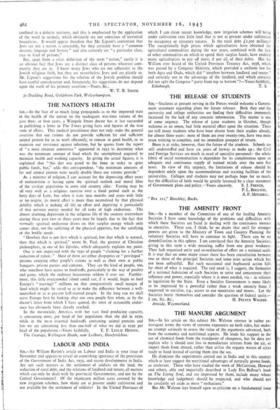THE NATION'S HEALTH
Si,—In the face of so much lying propaganda as to the improved state of the health of the nation on the inadequate war-time rations of the past three or four years, a Wimpole Street doctor has at last succeeded in publishing a letter in The Times giving facts and figures of the true state of affairs. This medical practitioner does not only make the general assertion that our rations do not provide sufficient fat and sufficient animal protein for us to work efficiently, to remain in good health, or to maintain our resistance against infection, but he quotes from the report of "a most eminent committee" appointed in 1933 to determine what was the minimum amount of food which the unemployed required to maintain health and working capacity. In giving the actual figures, it is explained that "this diet was pared to the bone in order to spare public funds, but," adds this correspondent, "the minimum .amounts of fat and animal protein were nearly double those our rations provide."
As a minister of religion, I can account for the depressing effect years of malnutrition is having upon the spiritual outlook and moral fibre of the civilian population in (own and country alike. Fasting may be all very well as a religious exercise over a fixed period such as the forty days of Lent, but when it runs into months and years with little or no respite, its moral effect is more than neutralised by that physical debility which is making all life an effort and depriving it particularly of that nervous energy needed for all tasks of high endeavour. The almost alarming depression in the religious life of the country everywhere during these past two or three years may be largely due to the fact that normally spiritual endeavour draws on that surplus energy which only comes after, not the surfeiting of the physical appetites, but the satisfying of the bodily needs.
"Howbeit that is not first which is spiritual, but that which is natural, then that which is spiritual," wrote St. Paul, the greatest of Christian philosophers, in one of his Epistles, which adequately explains my point.
One is not impressed with the type of people "claiming for a further reduction of ration." Most of them are either dyspeptics or " privileged " persons enjoying other people's rations as well as their own at public banquets. private parties and canteens. They are the kind of people, too, who somehow have access to foodstuffs, particularly in the way of poultry and game, which the ordinary housewives seldom if ever see. Further- more, this little overcrowded island could not, if it would, begin to feed Europe's "starving? " millions on that comparatively small margin of food which might be saved so as to make the difference between a well- nourished or as at present half-starved people. In the long run we shall serve Europe best by looking after our own people first when, as by the doctor's letter from which I have quoted, the limit of reasonable endur- ance has obviously been already reached.
In the meanwhile, America, with her vast food producing capacity, is consuming more per head of her population than she did in 1939, while in the mcst essential foodstuffs containing animal proteins and fats we are consuming less than one-half of what we did in 1939 per






























 Previous page
Previous page